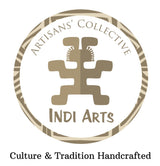
Remember the last time you went to your favorite clothing store, picked up a product, and thought about the skilled hand that created such a glorified possession? If you’re one of the 70% of the world’s population that has probably never done that, no worries. You’re not alone.
But I hope now you’re thinking, “do people actually do that?” Because the truth is, some do. There are people out there that question the ethics behind how products are made and/or traded. And hopefully by the end of reading this, you’ll be part of that tribe.
The Basics of Fair Trade Fashion
(And Fair Trade in general)
The official Fair Trade organization is a third party entity that provides certifications for companies who wish to create ethical work environments and distribute sustainable products. Fair Trade goes through businesses' selling processes to ensure that all people in the making and trading process are treated ethically and paid a fair price. In return for this service, businesses pay Fair Trade in order to obtain and keep their certification. That being said, there are companies who live and breathe the same values as the Fair Trade organization, while not being "Fair Trade Certified."
This is where lower-case "fair trade" comes into play. When a business claims to be a fair trade company, but there are no official certifications, it means that the business functions at a fair trade standard. Artisans, producers, and all others involved in creating, distributing, and selling are treated fairly and with respect. The product creators are given credit for their work and are paid what their time and work is worth, while creating sustainable trade relationships in the process.
At IndiArts Collective, we focus our work on creating partnerships with indigenous communities throughout Latin America that otherwise would have little opportunity to sell their goods. These artisans are skilled in their work, having had generations of knowledge and training passed down, and are therefore paid what their art and time are worth.
But it doesn’t end there.
These artisans spend hours handcrafting their goods. They use sustainable products that will last and are very meticulous with each design. These are the products that will stand the test of time.

How Does Slow Fashion Relate?
To understand slow fashion, it would help to first take a look at the meaning of fast fashion. Take a look at Google's definition:

Fast fashion is about here and now. It’s not about considering what’s best for the environment, what’s best for people, or what’s best even for ourselves.
Society in this day and age has been built on the idea that we can have whatever we want, at the time we want it. And therefore, to keep up with this unrealistic ideal, producers have increased their inventory in an unhealthy way. They produce more, we consume more, we throw out more harmful products that sit in landfills and release harmful gasses. In fact, it’s estimated that the fashion industry produces roughly 8-10% of the CO2 emitted in the air (equalling 4-5 billion tons annually) (Niinimäki). This is the result of increased production and an increased amount of clothing being cheaply made and thrown away too often. The clothing and textiles are unable to decompose, release chemicals into the air when burned, and provide no particular environmental benefit whatsoever.
Slow fashion, however, teaches you to go against every thought society has taught you to think.
Slow fashion is about wearing products that were made ethically- with both the environment and people in mind. As well as goods that pride themselves on sustainability; things that will stand the test of time (at least a good few years of time, not just a few months).
And this is where slow fashion ties into fair trade. IndiArts Collective not only focuses on people being treated fairly in the buying & selling process, we also focus on the environment being treated fairly. Sure, the products classified under “slow fashion” will take longer to produce, and they may cost more than the cheaply-made goods (rightly so), but haven’t you noticed how the things that are worth it take the most time and effort?
We don’t become successful overnight.
We don’t become our ideal self after one self-help class or book.
We didn’t build Rome or Paris or Rio in a day.
What Can You Do?
Pledge to yourself that you are going to try harder to live a more intentional life, whatever that means for you. You can make vows or promises or create sacred mantras, it’s up to you.
Further your research and deepen your knowledge on this subject. Resource after resource exists to aid in our ability to make informed decisions, but it’s our choice whether or not we are going to seek out that information.
Show your support for IndiArts Collective and our fair trade, slow fashion mission by subscribing to our newsletter, purchasing products (like the ones below) to help the Artisans who made them, and leaving reviews on the products you buy so others can see how awesome they are. Together we can help the indigenous communities we can’t reach on our own.
Now that you know what you do, what are you going to do about it?
Add any of our Wayuu Mochila bags to your outfit to support the artisan who made them. Get yours today!
(Click on each picture to view similar bags of different colors and patterns)
Additional Resources:
https://rdcu.be/b5Upz (This is the article the citation is from)
https://phys.org/news/2020-04-environmental-fast-fashion-sustainable.html
https://www.wbur.org/hereandnow/2020/01/24/how-us-clothing-is-made
Citations
Niinimäki, K., Peters, G., Dahlbo, H. et al. The environmental price of fast fashion. Nat Rev Earth Environ 1, 189–200 (2020). https://doi.org/10.1038/s43017-020-0039-9
